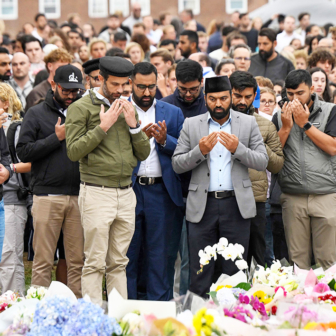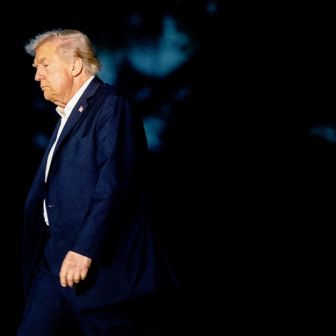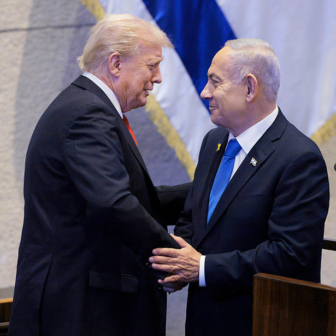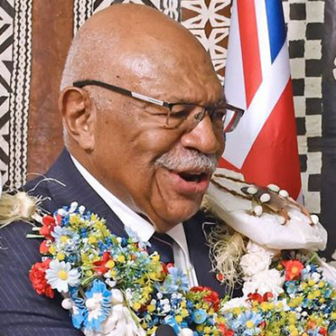THE sense of crisis that preceded Palestine’s application to the United Nations for admission as a state has entirely dissipated. The issue has disappeared from the media, the familiar deadlock over construction in the Israeli settlements has returned and – with the provocative timing to be expected from the present Israeli government – new construction has been approved in the disputed area in East Jerusalem, prompting the familiar ineffective Western protests. A return to business as usual? In all probability the answer is affirmative, at least in the short run, unless Western European governments can bring themselves to take an uncharacteristic initiative.
First, what of the crisis? It has become clearer that the tension was generated mainly by Israel and the United States. Both proclaimed that a unilateral move by the Palestinians would mean an end to negotiations for a two-state agreement and both threatened to withhold much-needed funding for the Palestinian Authority – in Israel’s case, taxes that it collects on behalf of the latter, in the United States’ case, that Congress would terminate financial support provided in recent years. The Palestinians’ claim that the move was intended, rather, to place the negotiations on a new foundation was more convincing, and points to the more plausible reason for the American and Israeli reaction: the move signalled an end to the acceptance of the US role as sole mediator in the relations between the two parties; in other words, it threatened the loss of American control over the “peace process” and the privileged position, and protection, that Israel enjoys within that framework.
As soon as the application was lodged, common sense returned. It was clear that it would be self-defeating for Israel to terminate negotiations or, even more so, to withhold financial support, opening the way for more extremist forces in Palestine. These dangers could be averted by the simple device of delaying decisions in the Security Council, which also saves the United States from a hostile Arab reaction should it veto the Palestinian application.
But the crisis was not wholly artificial. If a crisis is a moment when established practices have become untenable and new approaches suddenly become conceivable, then it is a moment of rare opportunity but also of serious risks. Netanyahu’s visit to Washington in May showed that the US-mediated “peace process” had become moribund, and the Arab Spring provided a favourable setting for a Palestinian initiative to place negotiations for a two-state agreement on a more favourable footing. But the move also held serious risks. If it proves fruitless the Palestinian Authority will be weakened or even wholly discredited, and Mahmoud Abbas will forfeit his newly won prestige; at worst, Palestinian frustration may lead to serious outbreaks of violence. The perception of a volatile regional environment provides a more valid reason for the Western sense of crisis, and Israel’s provocative move in approving new settlement construction shows a remarkable insensitivity to this environment.
The speeches to the United Nations by Barack Obama, Benjamin Netanyahu and Abbas did not bring much new enlightenment. Obama’s was surprisingly one-sided, highlighting Israeli concerns but not Palestinian rights, reaffirming his support for a two-state solution but reiterating the implausible contention that statehood and negotiation were alternatives. Netanyahu went further, claiming that the Palestinians wanted a state but not peace, giving no hint of endorsing Palestinian rights, and roundly condemning the United Nations for its bias against Israel. Abbas had the far easier task of presenting to a sympathetic audience the case for recognising Palestinian statehood after so many years of fruitless negotiation, but also reaffirmed his readiness to resume negotiations based on the 1967 frontiers and conditional on a settlement freeze.
Within a few hours of the debate the Quartet on the Middle East (made up of representatives of the United States, the European Union, Russia and the United Nations), which had been deadlocked during the preceding weeks, issued a statement calling for negotiations without preconditions to achieve an agreement by the end of 2012. This might be seen as undermining the argument that the Palestinian initiative ruled out negotiation, but perhaps assumed that a decision on statehood would depend on the outcome of the negotiations. The statement called on the parties to agree on a timetable within a month, to make proposals on frontiers and security within three months, and to reach substantial agreement within six months.
The statement had serious limitations, however. It omitted all reference to the “parameters” long regarded as necessary for an agreement – the 1967 frontiers, subjected to agreed exchanges of territory, each state to have Jerusalem as its capital, and adequate measures to ensure Israel’s security – and there was no mention of the settlements issue. It may be inferred that these omissions were at the insistence of the United States. The proposal was entirely to the liking of the Netanyahu government: it was committed to nothing, all the fundamentals were open to discussion, and it could engage in endless negotiation without having to move toward a two-state agreement, blame the Palestinians for obstructing agreement and continue unrestricted construction in the settlements. Not surprisingly, Israel accepted with alacrity, leaving the Palestinians to appear less accommodating by insisting on their precondition regarding the settlements.
Unless the “ community” is prepared to move beyond the Quartet’s formula, it will prove as abortive as Obama’s ill-fated call a year ago for a two-state agreement by the time of this year’s meeting of the UN General Assembly. The United States, it has become obvious, will do nothing constructive before the presidential election. The question is whether there is any other actor prepared to fill the ensuing vacuum and provide an impetus to the negotiations. In particular, might “Europe” – either the European Union or some of its leading members acting with its approval – be prepared to assume this role?
Major European interests are at stake, and European values have long been engaged. A loss of control by the Palestinian authority, desperate acts of violence by Palestinians and massive Israeli reprisals could prompt much wider disorder in the present regional environment, threatening Western economic interests (not only oil supplies, but also wider trading relations), and would make for unrest in Europe’s Muslim communities. And “European values” would appear ineffective and hollow if Europe passively watched such a process. But can it summon up the energy to intervene before such a deterioration becomes unmistakably clear? Can its leaders, under extreme pressure owing to the euro crisis, pay attention before it is too late? In the next phase, in all probability, the United States will press the Palestinians to abandon their precondition. Will the Europeans be prepared to take a contrary stand? There are likely to be frequent reminders of the dangers in the situation, such as recent acts of violence by extremist Israeli settlers against Palestinian lives and property.
The Israeli government’s spectacular deal with Hamas, exchanging over 1000 Palestinian prisoners for one Israeli soldier, introduces new complications. More than a little ironic in view of Israel’s expressions of outrage over the reconciliation agreement between Hamas and Fatah – announced earlier this year but yet to be implemented – it is seen as strengthening Hamas against its rival, and thus sending the message that violence pays. Abbas appears to be losing the initiative and may find it difficult to retain broad support for seeking a negotiated settlement. The situation surely calls for a move from outside to revive the ailing “peace process.”
The new diplomatic machinery available to the European Union under its foreign affairs and security policy representative, Catherine Ashton, provides it with the capacity to formulate policy. After a shaky start, Ashton is beginning to gain a certain diplomatic credibility. But her role could be no more than an initiator of proposals for the EU governments, and agreement among all member governments would require protracted negotiation, making for delay and lowest-common-denominator decisions. What might be conceivable would be agreement in principle to a course of action, the details to be worked out by whoever was authorised to implement the policy.
Alternatively, the initiative might come from a few members – the Libyan model – who would likewise have to seek broad agreement before taking up a position. The success of the Libyan intervention – at least as perceived by its initiators – might encourage this approach. But what might such an initiative attempt to achieve? The immediate aim, presumably, would be to overcome the present deadlock such that meaningful negotiations toward a two-state agreement could proceed.
But it would need to recognised that the Netanyahu government is fundamentally opposed to such an agreement, notwithstanding his own lip-service to it. Substantial progress is unlikely under the present coalition. It would seem prudent to focus on the first steps – the first three months of the Quartet’s schedule, and in the first place the immediate obstacle, the settlements issue. Here the Europeans would lose all credibility if they simply endorsed the American and Israeli approach.
But could a European stand, however determined, influence the Netanyahu government after it had successfully defied Obama on that issue? It would, of course, win strong support in the region, and the heightened isolation might disturb some Israeli officials, but this would not be decisive, as the recent rigidity towards Turkey would suggest. While any communication would have to be addressed to the Israeli government, its real message would have to be to the Israeli people – as always, divided but with many surely uneasy over the issue. The tone and content of such a démarche would be important, but so would its manner of presentation. A major address by a prominent European leader, delivered in the region, would have an impact of a different order from an anonymous statement issued in Brussels. It is not difficult to envisage themes that might form part of such an address: that the settlements constitute a form of aggression against a neighbouring people, the strength of feeling that they are illegitimate as well as illegal, that they have no place in the present century, that they are unworthy of a great nation, that they foster the kind of violence by extremist settlers that has recently been observed, and so forth. Needless to say, the speech would also have to be supportive of Israel’s well-being and security.
A successful diplomatic initiative would call for unorthodox thinking. Many commentators have recognised, for example, that if left to themselves, the two parties will be unable to reach agreement. The US approach, remaining in the background, favours the party that is stronger and averse to the kind of changes that any agreement would entail. A more active mediator would have to question and cajole both parties, but the logic of moving towards an agreement requiring asymmetrical “concessions” would tend to lead it to be more supportive of the party pressing for changes from the present status quo. The potential task for diplomacy is daunting. It must be hoped that, if Europe takes up the challenge, it will be equal to its demands. •




